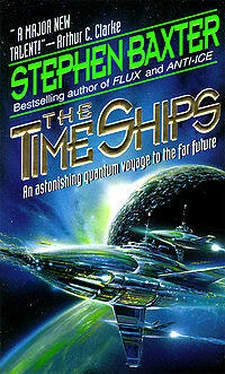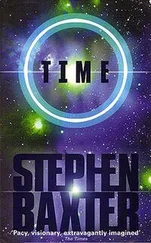“Look here, old chap,” I said, “the Morlock might look a little strange, but he knows a sight more medicine than I do — or you, I should hazard. I think it’s best if we keep out of his way for a bit, and let him treat the Captain.”
Stubbins’s great hands flexed.
At length I had an idea. “We still need to seek out any others,” I said. “Why not build a fire? If you use green wood, and produce enough smoke, you should raise a signal which will be visible for miles.”
Stubbins fell in with this suggestion with alacrity, and he plunged without delay into the forest. He was like some clumsy animal as he hauled out branches from the wood, but I felt relief that I had found a useful purpose for the helpless energy surging within him.
Nebogipfel had prepared a series of opened palm-nut shells, set in little cups in the sand, each filled with a milky lotion he had devised. He asked for Stubbins’s clasp-knife; with this, he began to cut away Hilary’s clothing. Nebogipfel scooped up handfuls of his lotion and, with his soft Morlock fingers, he began to work it into her worst-damaged flesh.
At first Hilary, still all but unconscious, cried out at these ministrations; but before long her discomfort passed, and she appeared to be passing into a deeper, more peaceful sleep.
“What is the lotion?”
“A salve,” he said as he worked, “based on palm-nut milk, bivalve oil and plants from the forest.” He pushed his slit-mask more comfortably over his face, and left on it streaks of the sticky lotion. “It will ease the pain of the bums.”
“I’m impressed by your foresight in preparing the salve,” I said.
“It did not take much foresight,” he said coolly, “to anticipate such victims, after your self-inflicted catastrophe of yesterday.”
I felt a stab of irritation at this. Self-inflicted? None of us had asked the confounded German to come through time with his Carolinum Bomb. “Blast you, I was trying to congratulate you on your efforts for this girl!”
“But I would much rather not have you bring me such sad victims of folly, as exercises for my compassion and ingenuity.”
“Oh — confound it!” The Morlock really was impossible at times, I thought — quite un-human!
Stubbins and I maintained our bonfire, feeding it with wood so green it spat and fractured and sent up billows of cloudy-white smoke. Stubbins set off for brief, ineffectual searches of the forest; I was forced to promise him that if the fire met with no success in a few days, we should resume our expedition around the explosion epicenter.
It was on the fourth day after the Bombing that more survivors began to arrive at our beacon. They came alone, or in pairs, and they were burned and beaten up, clothed in the ragged remnants of jungle kit. Soon Nebogipfel was running a respectable field hospital — a row of palm-frond pallets, there in the shade of the dipterocarps — while the able-bodied among us were set to work with rudimentary nursing duties and the collection of more supplies.
For a while we hoped that there might be, elsewhere, some other encampment better equipped than ours. Perhaps Guy Gibson had survived, I speculated, and had taken things in hand, in his practical, level-headed way.
We had a brief burst of optimism along these lines when a light motor vehicle came bounding along the beach. The car bore two soldiers, both young women. But we were to be disappointed. These two girls were merely the furthest-flung of the exploratory expeditions the Force had sent out from its base: they had been following the shore to the west, looking for a way to strike inland.
For some weeks after the attack we maintained patrols along the beach and into the forest. These occasionally turned up the remains of some poor victim of the Bombing. Some of these appeared to have survived for a time after the first blast, but, enfeebled by injuries, had proved unable to save themselves or call for help. Sometimes a bit of kit would be brought back. (Nebogipfel was keen that any scraps of metal should be retrieved, for he argued that it would be some considerable time before our little residual colony would be able to smelt ore.) But of further survivors, we found none; the two women in their car were the last to join us.
We kept the signal fire burning, though, day and night, long after any reasonable hope of more survivors had vanished.
All told, of the hundred or more Expedition members, twenty-one individuals — eleven women, nine men, and Nebogipfel — survived the Bombing and fire-storm. No trace of Guy Gibson was found; and the Gurkha doctor was lost.
So we busied ourselves with caring for the injured, with collecting the supplies necessary to keep us alive from day to day, and with assembling our thoughts for how we should build a colony for the future… for, with the destruction of the Juggernauts, it was soon evident to us all that we should not be returning to our home centuries: that this Palaeocene earth would, after all, receive our bones.
Four of our number died, of burns and other injuries, soon after being brought to the camp. At least their suffering appeared to be slight, and I wondered if Nebogipfel had tempered his improvised drugs in such a way as to shorten the distress of these afflicted.
I kept such speculations to myself, however.
Each loss cast a deep pall over our little colony. For myself I felt numb, as if my soul was replete with horror, and beyond further reaction. I watched the battered young soldiers, in their ragged, bloodied remnants of military kit, go about their dismal chores; and I knew that these new deaths, in the midst of the brutal, primitive squalor within which we now strove to survive, forced each one of them to confront his or her own mortality anew.
To make things worse, after a few weeks a new sickness began to haunt our thinned ranks. It afflicted some of those already wounded, and, disturbingly, others who had seemed, on the surface, to have been left healthy after the Bombing. The symptoms were gross: vomiting, bleeding from the body’s orifices, and a loosening of the hair, fingernails and even the teeth.
Nebogipfel took me aside. “It is as I feared,” he whispered. “It is a sickness brought on by exposure to Carolinum radiation.”
“Are any of us safe — or will we all succumb?”
“We have no way to treat it, save for the alleviation of some of the worst symptoms. And as for safety—”
“Yes?”
He pushed his hands under his slit-mask to rub his eyes. “There is no such thing as a safe level of radio-activity,” he said. “There are only degrees of risk — of chance. We may all survive — or we may all succumb.”
I found all this most distressing. To see those young bodies, already scarred by years of War, now lying broken on the sand, left this way at the hands of a fellow human, and with only the inexpert ministrations of a Morlock — a stranded alien — to treat their wounds… It made me ashamed of my race, and of myself.
“Once, you know,” I told Nebogipfel, “I think a part of me might have argued that War could ultimately be a force for good — because it might break open the ossified ways of the Old Order of things, and open up the world for Change. And once I believed in an innate wisdom in Humanity: that, after witnessing so much destruction in a War like this, a certain bluff common sense would prevail, to put a stop to it all.”
Nebogipfel rubbed his hairy face. “ ’Bluff common sense’?” he repeated.
“Well, so I imagined,” I said. “But I had had no experience of War — not of the real thing. Once humans start bashing each other up, precious little will stop them until exhaustion and attrition overcome them! Now I can see there’s no sense in War — not even in the outcome of it…”
Читать дальше
Конец ознакомительного отрывка
Купить книгу









